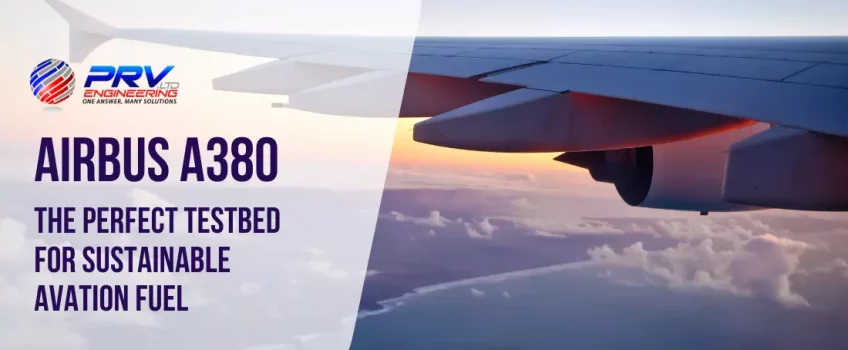
With all the talk about more sustainability in the aviation sector, it turns out old cooking oil could power the world’s largest passenger airliner. That is exactly what happened on the 28th of March 2022 when an Airbus A380 performed a first flight powered by 100% sustainable fuel.
A Testbed For Sustainable Fuel
The A380 is the world’s largest passenger airliner which has become the testbed for Sustainable Aviation Fuel (SAF) which mainly consists of cooking oil and other waste fats.
The company’s A380 test aircraft MSN 1 took off from Blagnac Airport in France for a test flight that lasted about three hours. It operated on one Rolls-Royce Trent 900 engine using 100% Sustainable Aviation Fuel. This marks a significant achievement toward realising the ambitious net-zero carbon emissions by 2050.
They also performed a second flight on the 29th of March to test take-off and landing using SAF. This is only the third Airbus aircraft to fly on 100% SAF in the last year and is also the largest by some distance. In 2021, the aviation giant also flew an Airbus A350 using Sustainable Aviation Fuel as well as an A319neo single-aisle aircraft.
Using Sustainable Fuel For Cleaner Aviation
To reach the net-zero target in aviation, increasing the use of sustainable fuel is crucial. According to key statistics from the Waypoint 2050 report, Sustainable Aviation Fuel could contribute between 53% and 71% of the required carbon reductions. For the latest test flight, Airbus used 27 tons of unblended SAF provided by TotalEnergies.
Currently, all Airbus aircraft can fly with up to a 50% blend of sustainable fuel mixed with kerosene. The primary goal is to achieve full certification for using 100% Sustainable Aviation Fuel by the end of the decade. This particular A380 is the same aircraft they recently revealed as the Airbus’ ZEROe Demonstrator which could be instrumental for testing future technologies. Considering the success of the test flight, we could see the world’s first zero-emission aircraft by 2035.
Recommended: Top Aviation Innovations For More Sustainable Transport
Is Carbon Neutral Possible By 2050?
Whilst the net-zero target may seem ambitious, it is certainly possible but the responsibility shouldn’t solely be on airlines. Willie Walsh of International Air Transport Association (IATA) believes that “achieving sustainable global connectivity cannot be accomplished on the backs of airlines alone. All parts of the aviation industry must work together within a supportive government policy framework to deliver the massive changes that are needed, including an energy transition.”
At the IATA 77th annual general meeting, they approved a resolution for the world’s air transport industry to achieve net-zero carbon emissions by 2050. It is in alignment with the Paris Agreement’s goal for global warming not to exceed 1.5°C.
Sustainable fuel has shown tremendous potential to help cut emissions in aviation which accounts for approximately 2% of global emissions every year. Many companies are testing their aircraft engines using SAF, including Rolls-Royce looking at alternative fuel sources in the future.
Conclusion
As mentioned earlier, all Airbus aircraft can already fly using up to 50% Sustainable Aviation Fuel mixed with kerosene. However, Airbus has plans to take things even further to earn 100% SAF flight certification before 2030.
While Airbus has stopped making the A380 due to low demand and high production costs, many are still in operation. They consider the Airbus A380 as the perfect testbed for sustainable fuel and technologies due to its spacious interior. As part of their plans, they announced plans to test the A380 using hydrogen engines by 2026.
Since PRV Engineering provides specialist services to the aerospace sector, among many others, we strive to bring you the latest news and updates from around the world. To stay informed, simply follow our weekly blog and join the conversation on social media using the hashtag #PRVtech


 Mail:
Mail: 



